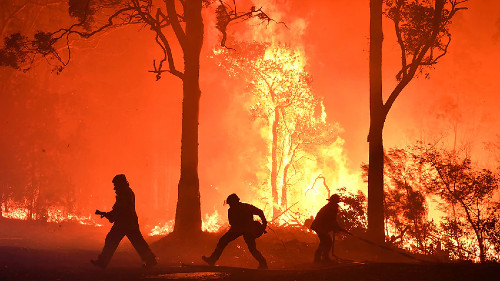Bill Mollison, the founder of the permaculture movement, is reputed to once have said - "You don't have a snail problem, you have a duck deficiency". You will probably see the relevance of my chosen title if you read to the end of this piece.
"The world is facing 'catastrophic' global warming, with 2020 among the hottest years on record, UN warns" - SBS TV News
Well, somebody has been warning of catastrophic climate change for many years now, and one of them would be me. So, this is nothing new. Nothing to see here. Move on - which is what you have been doing all that time, whether you like being told that or not. So don't get on my case when your tootsies start burning or something even more devastating happens to you. You should be expecting that to happen by now, and you won't have long to wait. Too long listening to 'experts', when those people are the last folk you should listen to. They all have an 'agenda' to follow.
Me, I have no agenda. No-one is paying me. I also don't have much skin in the game since I most likely won't be here when your tootsies ignite or you are dying from some other related scourge. So, you may as well listen. Anbd you don't really have to read the SBS article. It's just there to attract your attention. There, how's that for honesty.
Back in 2017, the good old days (remember that?), and while I was still posting on Facebook (vomit, vomit), I wrote this [yes, I still have a copy of every word I ever wrote on FB]:
Sunday, 24 December 2017 at 16:39 UTC+11
Bernie Edwards
'Earth will likely warm way beyond the crucial tipping point that the Paris agreement was meant to avoid' -- Without a shadow of doubt it will. Quote: "Since 1880, surface temperature has risen at an average pace of 0.13°F (0.07°C) every 10 years for a net warming of 1.69°F (0.94°C) through 2016. Over this 137-year period, average temperature over land areas has warmed faster than ocean temperatures: 0.18°F (0.10°C) per decade compared to 0.11°F (0.06°C) per decade. The last year with a temperature cooler than the twentieth-century average was 1976." https://www.climate.gov/.../climate-change-global... What these figures do not reveal is that, for most of that almost 140 years, the rate of decadal increase was less than half of what it is today. Do you remember when we were told, maybe as recently as 2013, that the global temperature had increased around 0.8°C - well today, last year actually, that increase sits at 0.94°C, a yearly increase of 0.04°C (that's every year, not every decade) for a decadal increase of 0.4°C. And the rate of increase will most likely rise from here on. Add on this years figure and within the next five or six years the Paris 'aspirational' limit of 1.5°C will have been breached - never to return in human civilisational timescales. Think a little further. Ten to fifteen years after that, the 2.0°C limit will have gone - the threshhold limit of climate disaster. The beginning of Hell on Earth. And what year will that be? Somewhere around 2033-2038. Is that worrying? Not for me. I'm unlikely to be here. But if you have some sort of life-plan mapped out... Think year-round California wild-fires (until there is nothing left to burn, that is), food shortages (that's a euphemism for starvation), drinking from whatever water you can find - if you can find it, no jobs, no transport, no health services, no government (sorry, that's on the plus side), no social cohesion. Maybe you should read a few post-apocalyptic fiction novels to get you in the mood. Of course you won't find it couched in those sort of terms from any government or corporate sources. And don't believe my research, do your own, it's not that hard. And even if you consider my figures are out marginally, this is going to be the situation by mid-century, not nearly as far away as 100 years from now.[end of post]
Well, to cut a long story short, nothing much has changed other than to get worse, and the current situation is this...
Since 1880 - 140 years ago - which is when some sort of reliable measures can be taken, to 2013 (which was roughly when there was some consensus that the world, on average, had warmed about 0.8°C - or, over that period, an increase in temperature of average 0.06°C every 10 years (with the greatest rate of increase assumed to be in the most recent of those years).
From 2013 to 2016, when a declared increase to 0.94°C was made, the rate of increase rose to ~0.04°C per year (or, for comparison, ~0.4°C per decade) roughly increasing six times faster than over the long term.
In 2017 there is mention of average temperatures of +1.0°C (0.98°C is also mentioned) increase since 1880 - a slight rate increase again, with either figure.
Now, in 2021 (2020 figures) we are told the average overall temperature increase stands at 1.2°C - a massive rate increase, taken over the three years '18, '19, '20, of almost 0.07°C per year - a full 0.7°C per decade.
Have you grasped the full import of that? Even with no further increase in the rate of growth of average global temperatures (an impossible dream), 1.5°C will be passed in 2024/5 and the dreaded 2.0°C knocked down by around 2032. And those are the best case scenarios from humanity's point of view.
Not that there is anything we can do about it, now. The old 'experts' ploy of "We've got a decade to act," no longer applies. The time to act, with any hope of changing anything, was probably sometime back in the '70s - the days of the flower people, psychedelic drugs and love-ins. I think some of us may have put some weak effort into trying. I think that was also when the term 'drop-out' was coined - these days such folk would be, in fact are, referred to as 'drop-kicks'. There weren't, and never will be I think, enough drop-outs to make a difference.
It was all to no avail, and nobody has made any effort at all since that time. The personal cost is too great. But not, I think, when measured against what we will suffer soon as a result of our failure to respect nature.
As a disclaimer, let me say, nothing is ever as simple as can be expressed in a few words in a blog article. Never. Of course the climate issue is much more complex than this piece may, on the surface, claim. But it does highlight something(s) that may not normally be discussed in relation to the subject. And that is all it sets out to do.
Author
 Bernard ("Bernie") Edwards blogs at NotSomethingElse and lives "as simply as I can, working towards having as few dependencies on the industrial system as possible" in Australia.
Bernard ("Bernie") Edwards blogs at NotSomethingElse and lives "as simply as I can, working towards having as few dependencies on the industrial system as possible" in Australia.
Bravo! We highly recommend Bernie's blog. ~ Ed.
![]() Don't forget to feed the birds. Every bread crumb helps! Donate here
Don't forget to feed the birds. Every bread crumb helps! Donate here





